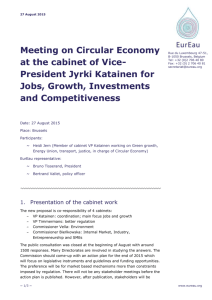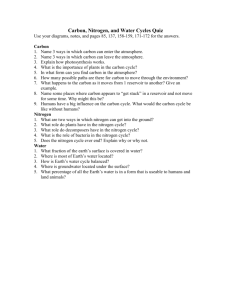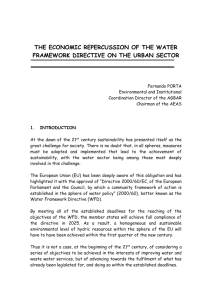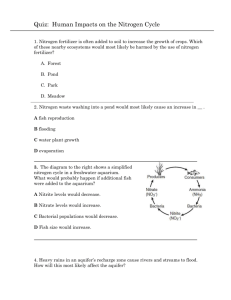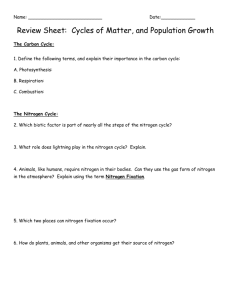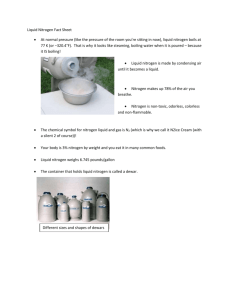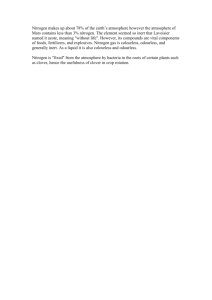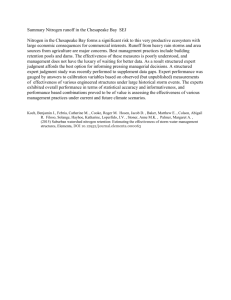Reactive nitrogen – Towards an integrated approach to
advertisement
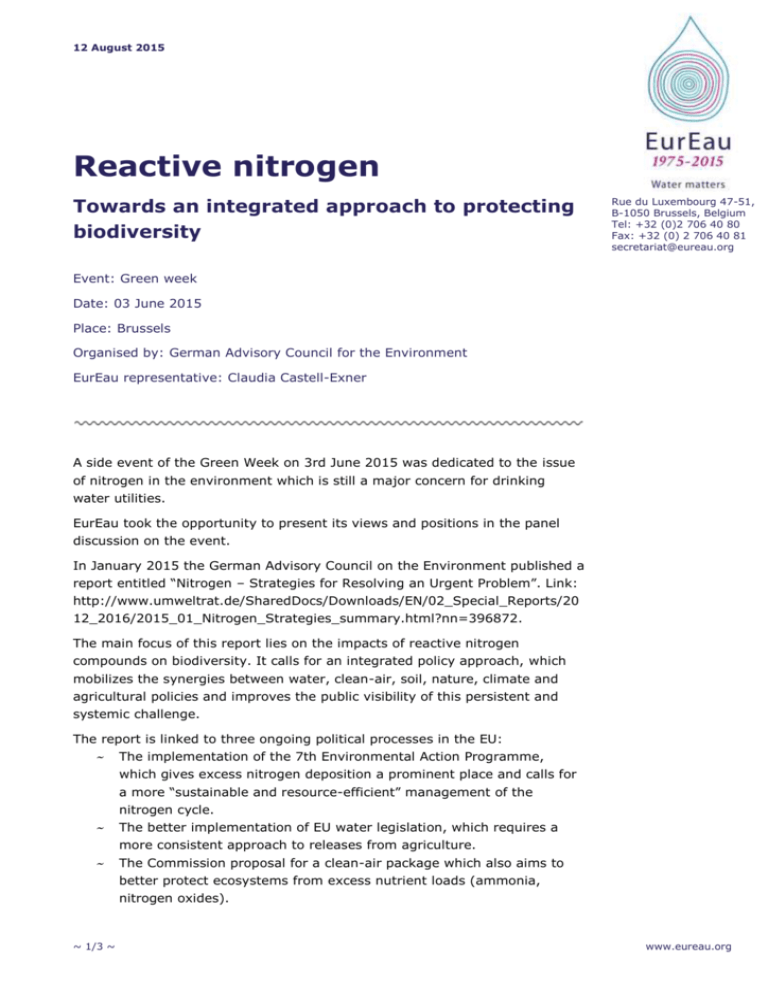
12 August 2015 Reactive nitrogen Towards an integrated approach to protecting biodiversity Rue du Luxembourg 47-51, B-1050 Brussels, Belgium Tel: +32 (0)2 706 40 80 Fax: +32 (0) 2 706 40 81 secretariat@eureau.org Event: Green week Date: 03 June 2015 Place: Brussels Organised by: German Advisory Council for the Environment EurEau representative: Claudia Castell-Exner A side event of the Green Week on 3rd June 2015 was dedicated to the issue of nitrogen in the environment which is still a major concern for drinking water utilities. EurEau took the opportunity to present its views and positions in the panel discussion on the event. In January 2015 the German Advisory Council on the Environment published a report entitled “Nitrogen – Strategies for Resolving an Urgent Problem”. Link: http://www.umweltrat.de/SharedDocs/Downloads/EN/02_Special_Reports/20 12_2016/2015_01_Nitrogen_Strategies_summary.html?nn=396872. The main focus of this report lies on the impacts of reactive nitrogen compounds on biodiversity. It calls for an integrated policy approach, which mobilizes the synergies between water, clean-air, soil, nature, climate and agricultural policies and improves the public visibility of this persistent and systemic challenge. The report is linked to three ongoing political processes in the EU: ~ The implementation of the 7th Environmental Action Programme, which gives excess nitrogen deposition a prominent place and calls for a more “sustainable and resource-efficient” management of the nitrogen cycle. ~ The better implementation of EU water legislation, which requires a more consistent approach to releases from agriculture. ~ The Commission proposal for a clean-air package which also aims to better protect ecosystems from excess nutrient loads (ammonia, nitrogen oxides). ~ 1/3 ~ www.eureau.org 12 August 2015 Green week side event - Reactive nitrogen – Towards an integrated approach to protecting biodiversity Those interlinked processes pose a challenge to multilevel governance: as the EU defines environmental reduction goals and quality objectives, the federal states and regions have the duty to implement the environmental directives, frequently without getting sufficient means from the national and EU levels. Agricultural policies play a pivotal role in resolving the problem at hand. Those three issues were the topic of the panel discussion with relevant stakeholders from Brussels: Pieter de Pous (European Environmental Bureau), Tania Runge (Copa-Cogeca), Dr. Claudia Castell-Exner (Chair EUREAU Commission 1 Drinking Water), Martin Häusling (Member of the European Parliament) and Thomas Henrichs (European Commission). The German Advisory Council on the Environment (SRU) has been advising the German government since 1972. The SRU is characterized not only by its expertise and professional independence, but also by its interdisciplinary approach. The Council’s key responsibility is the periodic evaluation of the environmental situation and of the environmental conditions in Germany. Besides this the SRU is active in analyzing the environmental policy of the EU. Claudia Castell-Exner expressed EurEau’s visions on water resources protection and indicated that agriculture is still the main source of environmental pressures on drinking water resources as also stressed in the last report (2013) on the Nitrates Directive. The European Commission reported as well in the recently published communication on the Water Framework Directive “Actions towards the “good status” of EU water” that the “implementation of the Nitrates Directive is not enough to tackle diffuse pollution to the level needed to secure WFD objectives” and “necessary measures have not been added to address the remaining shortcomings”. From EurEau’s point of view the objectives of Water Framework Directive mentioned in article 7 (3) Water abstracted for drinking water production are very valid but in reality the Member States doesn’t put the level of emphasis/ambition to implement this article in their programmes of measure and river basin management plans. Influencing agricultural practices which affects water is also an issue within the frame of the Common Agricultural Policy (CAP). Water-related crosscompliance requirements and the European Agricultural Fund for Rural Development are two instruments which have been determined to integrate European water policy objectives into the CAP. Unfortunately these approaches show delays and weaknesses as the Court of Auditors pointed out in this recent special report “Integration of EU water policy objectives with the CAP: a partial success” (2014). From this background the Court of Auditors strongly recommend that the necessary modifications of the current instruments (cross-compliance, rural development) are made or new instruments which are capable to comply with the WFD-objectives are developed and integrated in the CAP. ~ 2/3 ~ www.eureau.org 12 August 2015 Green week side event - Reactive nitrogen – Towards an integrated approach to protecting biodiversity EurEau’s positions on the CAP – as laid down in the position paper “Common Agricultural Policy – CAP after 2013; Greening of the 1st pillar (direct payments) “Blueing measures” to protect drinking water resources” on 1. Plant nutrition and fertilization; 2. Land utilisation and cultivation; 3. Plant protection (pest management); 4. Water management; 5. Organisation and management. were presented as well as EurEau’s views on emerging developments which interfere with the nitrogen issue like the biogas boom and climate change. With regards to the way forward EurEau addresses the following steps needed: ~ Evaluation of Nitrates Directive (1991) ~ Stronger implementation of Article 7 (3) WFD ~ Adjust CAP according to weaknesses adressed by Court of Auditors ~ Link CAP (water-related cross-compliance requirements) and WFD objectives. D:\Vorträge\2015\150603_Green week_SRU_panel\150808_resumee_Green week 2015_nitrogen.docx ~ 3/3 ~ www.eureau.org
